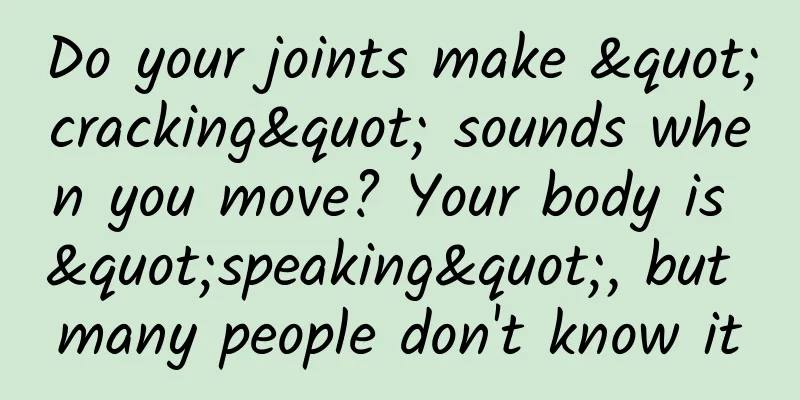Do your joints make "cracking" sounds when you move? Your body is "speaking", but many people don't know it

|
Reviewer of this article: Chen Haixu, Deputy Director and Master Supervisor of the Second Medical Center of PLA General Hospital Our bodies can actually "talk", such as the sound of our jaws when we yawn, the crackling of our joints when we squat, and the gurgling sound in our stomachs... Sometimes, these sounds are insignificant as physiological phenomena, but some sounds indicate that something is about to go wrong with your body. That is to say, when our body is about to "break down", it may convey information in the form of "making sounds". Did you receive them correctly? The jaw makes a clicking sound when yawning I wonder if you have ever heard your chin "click" when you are eating, laughing or yawning. At this time, you often touch your chin to make sure it is still there before you feel relieved. Copyright image, no permission to reprint This symptom is considered to be a temporomandibular joint disorder. According to epidemiological surveys, its incidence rate is between 28% and 88%, and the incidence rate in women is 2 to 5 times that in men. What is temporomandibular joint disorder? The temporomandibular joint consists of three parts: the condyle above, the glenoid fossa below, and the articular disc in the middle. When we open and close our mouth, there is a sound, which means that the joint disc does not move normally during the process of opening and closing the mouth, and bounces back and forth. This is temporomandibular joint disorder. Associated symptoms In addition to the sound when opening the mouth, temporomandibular joint disorder can also cause pain, which may be pain near the ear, around the jaw, or in the head and neck. The jaw may not be able to close after opening the mouth wide, or there may be an obstruction and pause, and then the mouth can be opened smoothly again after a while. If the situation continues to worsen, the jaw may drop and the mouth may be unable to close. If your jaw really drops, you must see a doctor immediately and have it repositioned using correct techniques. You should also be careful to limit your mouth opening, not to bite things with big mouthfuls, not to yawn casually, and even to support your chin when you laugh. How to avoid "dropping your jaw"? 1. Change the habit of unilateral chewing, pay attention to the balanced occlusion of the bilateral posterior teeth, and apply force evenly. 2. Avoid eating foods that are too hard, too tough, or too large, such as: toffee, beef jerky, sugar cane, oversized apples, etc. 3. Maintain a happy mood, avoid long-term mental stress, and avoid frequent clenching of teeth. The joints make a "cracking" sound when you move them When you get up in the morning, you twist your neck and hear a crisp "click" sound; some people also hear a "click" sound in their knee joints when they stand up; even when you sit and work for a long time, you stand up to move your body and twist your waist, which will make a sound. What's going on? In medicine, it is actually called "joint popping", which is caused by friction and collision of joint cartilage, but it does not necessarily mean there is a joint disease. Joint popping can be divided into physiological and pathological types. Physiological: Physiological joint popping is generally believed to be caused by the stretching and expansion of the joint capsule, which leads to a decrease in pressure and the sudden and violent precipitation of gases dissolved in the synovial fluid. Its characteristics are that it will not cause pain or joint disorders, but simply makes sounds, which are crisp and discontinuous and do not require special treatment. And appropriate physiological sound is good for the body. Because when the joints snap, the capillaries and peripheral nerves around the joints are stimulated in a benign way, which helps to relieve spasms, reduce inflammation, reduce pressure, and activate joints. This is one of the reasons why masseurs always make joints snap when massaging. Pathological: Pathological clicking is a clicking sound caused by abnormalities or damage to the joint's anatomical structure, such as cartilage damage, joint inflammation, etc. It is often accompanied by symptoms such as pain, numbness, and weakness. At this time, timely intervention is necessary to prevent aggravation. Even when you are not hungry, your stomach will still growl Everyone has experienced the "gurgling" sound of the stomach, which is easy to occur when the stomach is hungry or cold. This is medically known as bowel sounds. When the intestines move, the gas and liquid inside will move with it, making intermittent sounds of gas passing through water, which is also called gurgling sounds. Under normal circumstances, bowel sounds occur 4 to 5 times per minute, and the sound is relatively weak and gentle, and usually requires the use of a stethoscope to hear. When the stomach is hungry, or the abdomen is exposed to cold or heat stimulation for a short period of time, the stomach contracts violently, squeezing more air into the intestines, making the gurgling sound louder and easier to hear. However, if the frequency, pitch, and sound of bowel sounds change significantly even when you are not hungry, it may indicate a gastrointestinal problem and you should take it seriously! Active bowel sounds may indicate acute gastroenteritis or gastrointestinal bleeding If the number of bowel sounds increases to about 10 times per minute, the sound becomes louder but not high, and it feels like the stomach is constantly moving, it may indicate acute gastroenteritis or gastrointestinal bleeding. Among them, acute gastroenteritis may also cause burning pain in the upper abdomen, nausea, diarrhea, abdominal distension, and even high fever and coma in severe cases; gastrointestinal bleeding may be accompanied by vomiting blood and black stools. If the amount of bleeding is too much, symptoms such as panic, cold sweats and pale complexion may occur. Hyperactive bowel sounds may indicate intestinal obstruction If the frequency of bowel sounds increases significantly and the sounds are loud and high-pitched, or even tinkling or metallic sounds occur, intestinal obstruction may exist. Acute and chronic intestinal obstruction can easily cause symptoms such as abdominal pain, bloating, nausea, vomiting, and inability to defecate. It may also lead to intestinal tissue spasm, paralysis, ischemia, and even necrosis. Heart pounding "Bang, bang, bang..." In our daily lives, we always experience the pounding of our hearts, whether it's after exercise, smoking, drinking too much coffee or tea, or when we encounter something tense or exciting... However, if your heart beats wildly even when you are lying still, or if it keeps beating rapidly and is accompanied by discomfort, you need to be alert, as it may be arrhythmia! Arrhythmia is a large category of diseases in cardiology, including atrial fibrillation, atrial flutter, supraventricular tachycardia, premature ventricular contractions, ventricular tachycardia, etc. Among them, atrial fibrillation is the most common and the most dangerous! Atrial fibrillation is an independent risk factor for stroke During atrial fibrillation, the heart rate can reach 100-200 beats per minute, and in severe cases it can exceed 200. At this time, the heart beats without rhythm at all, and most patients will describe it as "heart beating violently", "heart beating randomly", "heart beating in the throat", etc. At this time, the heart's electrical transmission is disordered, the heart contraction is incomplete, the blood cannot be fully pumped out, and blood stasis is prone to form blood clots. Once it falls off with the blood flow, it can enter the body's blood circulation. When it enters the veins of the lower limbs, it can cause vascular embolism in the lower limbs. In severe cases, it can block blood flow, cause limb necrosis, or lead to amputation. When it enters the brain, it can cause cerebral embolism (stroke), with a mortality rate of up to 63%. In addition, data show that the incidence of stroke in patients with atrial fibrillation is 5-7 times that of those without atrial fibrillation! Therefore, if unexplained heartbeat disorder occurs, especially accompanied by dizziness, difficulty breathing, chest pain and other symptoms, you must seek medical attention immediately. Source: I am a great doctor official account The cover of this article and the pictures with watermarks in the text are from the copyright library and are not authorized for reproduction |
<<: Why do humans like to pick their feet?
>>: This computer powered by blue algae has been running non-stop for six months
Recommend
World Meteorological Day丨Spanning two centuries, the "super-super-long struggle history" of weather radar
March 23 is the 65th World Meteorological Day. Th...
APP channel promotion: 3 major channels and experience sharing!
As the Matthew effect in the industry deepens, it...
Inheriting Steve Jobs's wish, Apple University plans to enter China
[[122186]] On November 4, people familiar with th...
Analysis of mobile advertising market in Q1 2021
After a comprehensive analysis of the mobile adve...
A brief analysis of the successful cases of leveraging marketing on New Year’s Eve!
New Year's Day is the beginning of the new ye...
9 knowledge points for marketers in 2020!
2020, the sky is full of black swans. The economy...
When was the Communist Youth League founded? What is the age range of the group members?
The Communist Youth League of China is a mass org...
“Earthquake clouds”, “red light in the sky”… Were there early signs of the Shandong earthquake?
According to the China Earthquake Networks Center...
Do animals know their fate in advance?
© Brad Wilson Leviathan Press: At the beginning o...
Turning the computer off and on again does not equal restarting, don’t get it wrong!
Mobile phones have become our close "partner...
Heavy rain is coming! You should know these self-help knowledge
Since April, most of southern China has experienc...
Why are you losing users? There are some ways to improve user retention!
In the Internet industry, we usually attract new ...
China Automotive Power Battery Industry Innovation Alliance: China's power battery installed capacity in July 2022 was 24.2GWh, a year-on-year increase of 114.2%
Recently, the China Automotive Power Battery Indu...
2021 Information Feed Advertising Trends: Video Materials
This article will talk to you about the video mat...
How does cancer come about? You will be enlightened after reading this!
When people are unfortunately diagnosed with canc...









